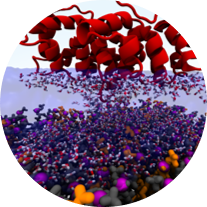Molecular Life Sciences
Water is the molecule of life, ubiquitous in biological environments and indispensable for biochemical reactions. Living cells contain about 60-70% water, and evolution has optimized the sophisticated biological processes that determine life to function in an aqueous environment. One of the most striking challenges is correlating water’s intrinsic physical properties –hydrogen bonding, polarizability,and collective vibrational states –with its spontaneous capacity to generate frustratedorder out of apparent chaos. Understanding the interplay between the bulk-water activity that is influenced by co-solutes, pressure and temperature, and the formation of the solvation shells which envelope macromolecules and –especially in the case of DNA and RNA –their counterions is crucial for understanding structure and the structural dynamics of biological systems. The influence of water on the association state(s) of proteins, RNA, DNA, lipids and carbohydrates is also of the highest interest. The formation of higher-order assemblies consisting of multiple components are fundamental to all intracellular processes and are associated with a number of disease states. Therefore, the role of water in biomolecular structure, be it defined and ordered or intrinsically disordered, and the link that water provides between structure, bio-catalysis, regulation,and molecular transportwill be the focal points for biochemical and biological function research.
Speakers: Arwen Pearson (U Hamburg), Simone Techert (DESY/U Göttingen), Sadia Bari (DESY), Henrike Müller-Werkmeister (U Potsdam).

